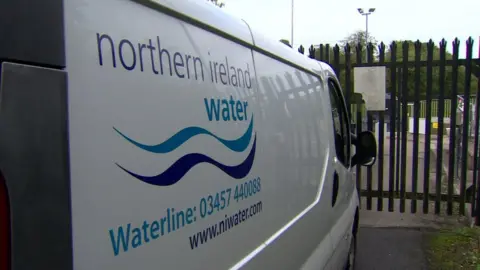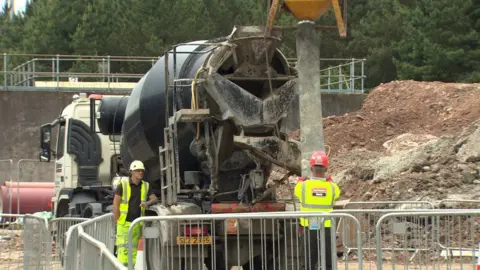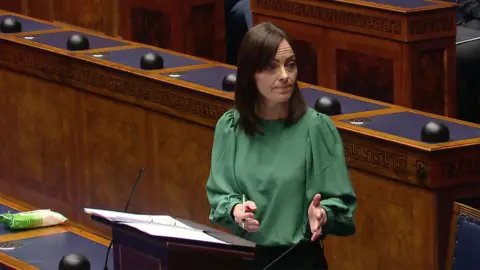NI Water: Wastewater crisis stalling big projects, say builders
 BBC
BBCA lack of capacity in water and wastewater infrastructure is stalling building projects in Northern Ireland, a group of developers has said.
The water and sewerage system operator Northern Ireland Water has planned to spend £2bn on infrastructure over the next six years.
Infrastructure Minister Nichola Mallon has approved the funding for the first year of the plan at a cost of £179m.
But it is not clear if the Stormont executive can fully fund the remainder.
The water system in Northern Ireland is mostly funded by government resources rather than consumer charges.
That is different to other parts of the UK where consumers foot the bill.
NI Water is government-owned and funded by the block grant provided to Stormont by the Treasury.
It outlines how much investment it needs in a plan that must be approved by the Utility Regulator - it is then up to the executive to fund it.
 Getty Images
Getty ImagesA major part of the planned infrastructure spending is for an upgrade of Belfast's wastewater system.
The city's water treatment works is operating at 40% above its designed capacity and is therefore cited as a constraint on new development in the city.
'Problem already here'
Several Northern Ireland housebuilding firms have come together to form a campaign group called Drains for Development to raise awareness of what they describe as "the wastewater infrastructure crisis".
The group was formed by major developers including Braidwater Homes, Fraser Houses, Lagan Homes NI and others.
"There has been a failure to fund this infrastructure for years," said Conor Mulligan, the managing director of Lagan Homes.
"As developers we look 10 to 20 years ahead of us but the problem is already here.
"We are seeing limitations on all sorts of developments in Northern Ireland, whether that be housing - private, social, schools, hospitals.
"Over 90 of our treatment plants are either at or near capacity so development in those areas has been brought to a standstill."

NI Water finance director Ronan Larkin said major funding was needed to address "historic underinvestment" in the water system.
"We have to invest in both network and treatment so that we can take the additional loads that come from a growing population, a growing housing stock and a growing economy," he said.
"What we need to do now is find a way with the executive to move to a multi-year funding commitment that will underpin the £2bn investment necessary.
"If we do that it will begin to address this historic underinvestment."
After the first year of the NI Water plan, the funding requirement increases sharply, peaking at almost £450m in 2026.
There is no guarantee that future years of the plan will be funded as Stormont allocates its resources annually.
'Funding need must be met'
Infrastructure Minister Nichola Mallon said that executive had to be decisive on the issue.
"This has to come from the executive - the executive's policy is that there are no water charges," she said.

"If that [continues to be] its policy then it needs to honour that by providing the funding that is required.
"Otherwise it's very simple - we won't create employment, we won't grow our economy and we won't tackle our housing crisis.
"The funding requirements need to be met year on year and that's why it's really important that we move as an executive towards multi-year budgets."
The New Decade, New Approach deal, which restored devolution at Stormont in 2020, included a commitment for the executive to "invest urgently in wastewater infrastructure which is at or nearing capacity in many places across Northern Ireland".
The amount of money available for infrastructure spending will largely be determined by the UK government's comprehensive spending review.
The Stormont parties could also revisit a plan for consumer charges but there is little political appetite to do so.